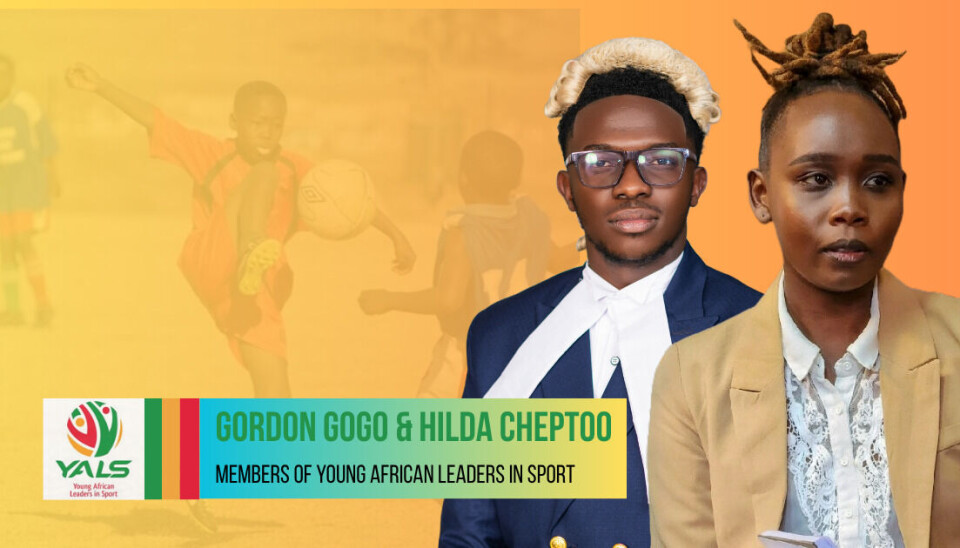Copyright : Re-publication of this article is authorised only in the following circumstances; the writer and Africa Legal are both recognised as the author and the website address www.africa-legal.com and original article link are back linked. Re-publication without both must be preauthorised by contacting editor@africa-legal.com
From broadcast booths to boardrooms: a YALS dialogue

SportzBiz Africa Forum 2025 will be held over 9-10 September in Kigali. Recently, Young African Leaders in Sports (YALS) members Gordon Gogo and Hilda Cheptoo were selected for prestigious Johan Cruyff Institute inspired courses with the chance to live pitch their sporting projects at this year’s SportsBiz Africa Forum.
In the ever-evolving world of African sport, youth leadership is increasingly defined by collaboration, innovation, and cross-disciplinary expertise. Recently, Hilda Cheptoo, a rising sports journalist and radio presenter, and sports lawyer Gordon Gogo, founder of sports intelligence app Mchezaji, were named among a select group described by SportsBiz Africa Forum as “the future of African sports”.
SportsBiz Africa 2025 is a trailblazing forum that will bring together industry leaders, innovators, and visionaries to explore how to collectively transform Africa’s sports sector into a thriving hub for business, development, and opportunity.
Ahead of this year’s forum, the second edition of exclusive Essentials in Sports Management masterclasses run in collaboration with Johan Cruyff Institute take place, designed to equip selected young African rising stars to equip themselves “to transform the sports and business landscape across the continent”.
At the completion of the three-month course, the candidates will each submit a final project, with the three best projects getting to live pitch at SportsBiz Africa 2025.
Young African Leaders in Sports (YALS) members Hilda Cheptoo and Gordon Gogo, two finalists of the Essentials in Sports Management, share their journey.
Gordon: Hilda, how did you feel when you found out you were selected?
Hilda: I was genuinely surprised, then excited. I’d applied for a similar scholarship last year and didn’t get it, so this felt like my second chance. The course seemed like a perfect opportunity to gain deeper knowledge about the sports industry.
Gordon: Same here. I was pleasantly surprised as well. Having recently completed a course in Data Analytics in Sports Management from SUNY Buffalo, I saw this as the next logical step — especially as I dive deeper into club and sports management. It complements my work advising clients and building Mchezaji, my startup.
Hilda: What does this mean for your professional path?
Gordon: It’s a major milestone. This training equips me to offer cross-border consulting services across Africa. It’s already influencing how I’m preparing Mchezaji for piloting in August — grounding it in real-world, elite-level sports management frameworks.
Hilda: I feel similarly. As a sports radio presenter, these insights are reshaping how I think and communicate about sports. I now understand how leadership, marketing, and finance all interconnect — and I want to localize this knowledge for the African context.
Gordon: How does this tie into our goals at YALS?
Hilda: At YALS, we advocate for youth leadership in sport, and education is core to that. This course is helping me grow into the kind of leader who can mentor others and build better sports institutions. I hope it inspires others to pursue opportunities like this.
Gordon: Precisely. I joined YALS to help guide the next generation of sports professionals. By gaining top-of-the-shelf training, I can now mentor with more credibility and impact.
Hilda: Which course topic really hit home for you?
Gordon: Marketing. In Africa. We often treat sport like a charity instead of a commercial product. That leads to flawed strategies and missed opportunities. This course has sharpened how I advise clients on building viable, profitable sports businesses.
Hilda: For me, it was the leadership module. Understanding the different leadership styles and how to manage diverse stakeholders was eye-opening. It reinforced that professionalism, structure, and the right leadership are non-negotiable in sports success.
Gordon: I’ve followed your work in sports journalism, and I think you’re one of the voices pushing YALS forward. You’re using your platform to spread practical, relevant insights — and I’d love to collaborate on campaigns that merge my legal background with your media expertise.
Hilda: Thanks, Gordon. I admire how you’re building innovative solutions through Mchezaji. Your legal perspective adds real structure to the innovation we need in sport. Together, we could definitely amplify awareness and change through education and advocacy.
Gordon: What’s next for you?
Hilda: I’ll be applying the course insights directly to my radio work — simplifying complex sports business topics for our listeners and advocating for professionalism. I also hope to collaborate more with other finalists to improve sports management across the continent.
Gordon: My next step is to work more closely with Kenyan sports institutions and show how data analytics and management systems — like what I’m building in Mchezaji — can transform their operations. This course is a springboard to expanding my footprint across Africa.
Hilda: For me, being a finalist means I have the ability to make impactful change in the African sports ecosystem. It’s a challenge and an opportunity I’m proud to take on.
Gordon: Couldn’t agree more. This recognition is a catalyst — not just for our personal growth, but for the broader transformation of African sport through informed, empowered leadership.
